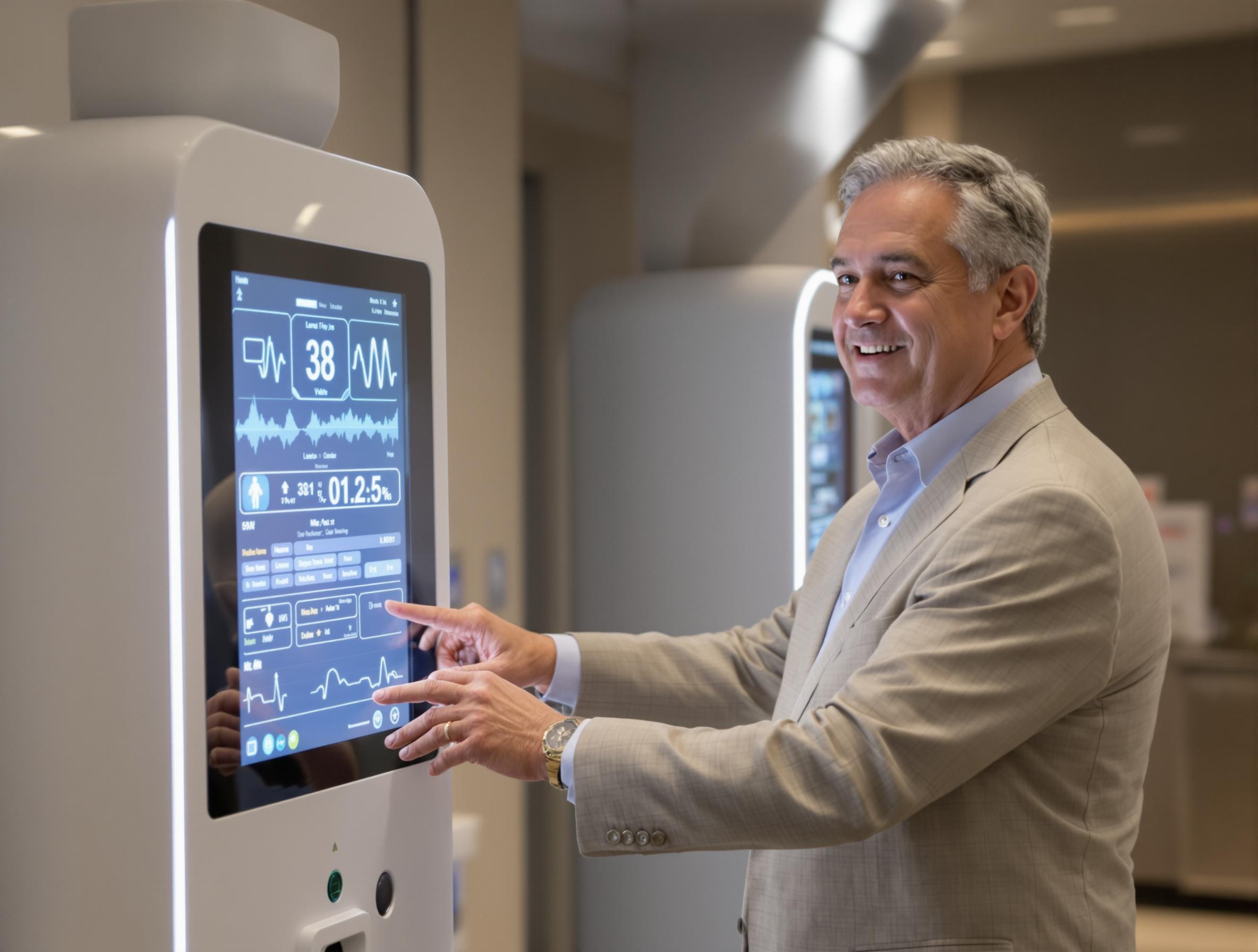What Causes High Blood Pressure?

Key Takeaways:
- High blood pressure can be caused by a mix of lifestyle habits, genetic factors, and underlying health conditions.
- Diet, exercise, stress management, and medical care can significantly lower your risk.
- Mobile Care Health can help you monitor and manage your blood pressure, making prevention easy and convenient.
We’re all about empowering you to live your healthiest life at Mobile Care Health, and today we’re tackling a topic that affects millions worldwide: high blood pressure (also known as hypertension).
You’ve probably heard your doctor mention it, or maybe you’ve seen it pop up in health articles or news segments. But have you ever wondered what causes high blood pressure?
Spoiler alert: It’s not just about eating too many salty snacks (though that doesn’t help!). High blood pressure can result from various factors—some you can control and others can’t.
Ready to roll? Let’s decode the mystery behind hypertension together!
What Is High Blood Pressure?
Before we look into the “whys,” let’s quickly recap the “what.”
Blood pressure measures the force your blood exerts on your artery walls as it circulates. It’s expressed in two numbers:
- Systolic pressure (the top number): the pressure when your heart beats
- Diastolic pressure (the bottom number): the pressure when your heart rests between beats
A normal blood pressure is typically around 120/80 mmHg. High blood pressure is usually diagnosed when your numbers consistently sit at or above 130/80 mmHg.
High blood pressure is nicknamed “the silent killer” because it often has no apparent symptoms, but it can lead to serious problems like heart disease, stroke, and kidney issues.
So let’s pull back the curtain on what’s behind those high numbers!
Key Causes of High Blood Pressure
1. Genetics and Family History
Let’s start with the part you can’t change: your genes.
If your parents or close relatives have high blood pressure, you’re also more likely to develop it. This genetic link doesn’t guarantee you’ll have it, but it does mean you’re at higher risk.
Think of it as a game of cards: you can’t choose the hand you’re dealt, but can decide how to play it.
2. Diet and Nutrition
Here’s where your daily choices come into play. Your eating habits can have a significant impact on blood pressure:
- Too much salt (sodium): Excess salt makes your body hold onto water, boosting blood volume and pressure.
- Not enough potassium: Potassium helps balance sodium in your body. Skimp on potassium-rich foods like fruits and veggies, and you might see your numbers climb.
- Fatty and processed foods: Diets high in saturated fats and processed foods can harden arteries, making it harder for blood to flow smoothly.
3. Alcohol and Smoking
Pouring that extra drink or lighting up a cigarette? Unfortunately, both can spike your blood pressure.
- Alcohol: Moderate drinking is okay for some, but regular heavy drinking increases your risk of hypertension.
- Smoking: Smoking damages your blood vessels, making them narrower and stiffer, perfect conditions for higher pressure.
4. Lack of Physical Activity
Our bodies were built to move! When we’re sedentary (thanks, streaming marathons), our heart and blood vessels get out of shape. This inactivity can lead to weight gain and higher blood pressure.
The good news? Just 30 minutes of moderate daily exercise (like brisk walking or dancing) can make a real difference.
5. Weight and Obesity
Carrying extra pounds puts extra strain on your heart. It’s like asking your heart to pump blood through a bigger, more challenging obstacle course.
Even losing a few pounds can help lower your blood pressure and make your heart’s job easier.
6. Stress
Stress is sneaky. It doesn’t just mess with your mind—it also affects your body.
Chronic stress can cause temporary blood pressure spikes. Over time, these repeated spikes can damage your arteries and lead to long-term hypertension.
Finding healthy ways to manage stress, like deep breathing, meditation, or yoga, can be powerful tools for protecting your heart.
7. Sleep Problems
Do you snore loudly or wake up feeling unrested? Sleep apnea and poor sleep quality can raise your blood pressure.
When sleep is disrupted, the body doesn’t get the deep rest it needs, which can increase inflammation and stress hormones—two things that are not great for the heart.
8. Underlying Health Conditions
Some health conditions can also contribute to high blood pressure, including:
- Kidney disease
- Diabetes
- Thyroid disorders
- Hormonal imbalances (like high aldosterone)
Treating these conditions often helps bring blood pressure back into a healthier range.
Putting It All Together: Your Personal Risk
Here’s the deal: most of us have at least one of these risk factors. But it’s the combination of these factors that matters.
For example, if you have a family history of hypertension and you’re dealing with lots of stress, eating fast food on the regular, and skipping exercise, your risk skyrockets.
The power here? You can control many of these risk factors! That’s where Mobile Care Health comes in—our team can help you monitor your blood pressure, make clever lifestyle tweaks, and tackle risks head-on.
Fun Fact: Blood Pressure Around the World
Want to nerd out for a sec? Let’s zoom out and look at how blood pressure varies globally:
- In Japan, older adults tend to have higher rates of hypertension, possibly linked to high-sodium diets (hello, miso soup!).
- In the Mediterranean region, diets rich in olive oil, fish, and fresh veggies are associated with lower blood pressure.
- In the U.S., nearly half of adults have high blood pressure.
This global snapshot reminds us that while genes and environment matter, lifestyle is a powerful puzzle.
How to Prevent High Blood Pressure
Let’s shift gears to something positive: what you can do to prevent (or manage) high blood pressure.
Eat a heart-healthy diet
- Load up on fruits, veggies, lean proteins, and whole grains.
- Limit processed foods and added salt.
Move your body daily
- Aim for 30 minutes of exercise most days of the week.
- Find something you love—dancing, biking, swimming—so it feels fun, not forced.
Manage stress
- Deep breathing, journaling, or connecting with loved ones can all help.
- Even short relaxation breaks can calm your nervous system.
Maintain a healthy weight
- Small, consistent changes (like swapping soda for water) can help with weight loss.
Cut back on smoking and alcohol
- If you need help, talk to your doctor or join a support group.
Get quality sleep
- Aim for 7–9 hours of rest each night.
- If snoring or poor sleep is an issue, chat with your doctor—it might be more than just loud breathing.
How Mobile Care Health Can Help
High blood pressure isn’t just a number on a doctor’s chart—it’s a wake-up call to care for your heart and body. You’re already ahead of the game by understanding what causes high blood pressure.
Remember: while you can’t change your genetics, you have the power to transform your lifestyle. And with Mobile Care Health by your side, managing your blood pressure can be easier, more effective, and even a little fun!
Articles on this site are for general education and do not substitute for professional medical advice. Consult our providers for personalized recommendations





